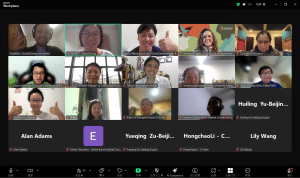This article is part of CDB’s Special Focus on ‘Effective Communication and Cooperation between NGOs and Business’. It originally formed the tenth case study in CDB’s latest research report which we released in July 2015 (you can view the original here). Over the next few weeks we will be publishing translations of the ten case studies contained in that report. The case studies detail partnerships between Chinese NGOs, foundations, and businesses.
Chinese NGOs seeking to cooperate with businesses can find that their principles are tested when identifying potential partners. Polluting companies that have been criticized by environmental protection organizations might look to support an education program; those that have a bad international corporate social responsibility (CSR) record might set up a public welfare award domestically or provide financial support to a well-known domestic public welfare organization. Organizations in the public welfare sector have continuously discussed the following question: should organizations active in environmental protection, education, welfare and other sectors band together to boycott companies with bad track records, or should they accept money from these sources in order to secure the survival of the organization? Perhaps accepting money doesn’t necessarily mean that an organization can no longer oppose the company? In the public welfare sector, it’s already difficult to find common ground on these issues.
Some NGOs believe that business and public welfare should be separated, that public welfare must maintain its purity and shouldn’t be misused as a vehicle for corporate “contraband”; other experts emphasize that completely separating business from public welfare would hinder social innovation. In seeking to strengthen the value of social partnerships they argue that the traditional view of not seeking returns from engaging in public welfare needs to be dispelled and social return stressed. Overall they say that if public interest issues are linked with the unique capabilities of industry, then both sides stand to gain.
Case study: APP Youth Public Service Internship program causes confusion
Small NGOs can find corporate assistance alluring.Tempted by easy money and greater freedom of operation, many organizations establish long-term cooperative relationships with businesses. Behind the alluring façade, however, the demands of the business are often at odds with the principles of the organization, and different groups have different views on whether to closely guard those principles or acquiesce to the company’s demands.
The “APP Youth Public Service Internship” is a public service program initiated by the Students in Free Enterprise Group (now known as Enactus) at Shanghai International Studies University and financed by the Huang Yi Cong Foundation, a subsidiary of the Indonesian Sinar Mas APP Group. The goal of the program is to select excellent university students who will spend their summer vacation engaged in public service, thereby providing NGOs with high quality human resources. With the financial support of the Sinar Mas APP Group, the program was a success in 2010 and 2011.
Just as the “APP Youth Public Service Internship” was beginning its campus tour in preparation for the third year of the program in 2012, public welfare activist “Jian Gemin” published a number of articles on his blog concerning “investigations into APP’s forest destruction.” On Weibo, he commented that “in view of the fact that the APP Group is ignoring its corporate errors and continuing to destroy forests, I’m calling for a boycott of the APP Youth Public Service Internship program and for all public welfare cooperation with APP to stop until it makes the latest environmental statistics public, promises to implement biodiversity protection and accepts regular civil society supervision of its activities.” On the day his post appeared on Weibo, seven NGOs that participate in the program responded by stopping their cooperation with the Huang Yi Cong Foundation.
In fact, that boycott was only one instance of the APP Group generating controversy over “forest destruction.” In November 2004, Greenpeace released an investigative report to the media on the destruction of forests in Yunnan by the Sinar Mas Group, accusing the company of destroying local forests and creating serious ecological risks. The report received widespread public attention, with government ministries, APP and Greenpeace all sticking to competing versions of the story. Even though there were dissenting voices, the Greenpeace boycott was broadly implemented. In response, a large group of international companies, including Unilever, Nestle and Burger King ended their cooperation with APP.
After Jian Gemin called on public welfare groups to boycott the APP Youth Public Service Internship program, Greenpeace joined in without hesitation. During an “APP Youth Public Service Internship” event at Beijing Forestry University shortly after Jian Gemin made his comments, Greenpeace activists protested by dressing up as “homeless” animals. The event had to be called off as a result of the Greenpeace protest. Other campus events also had to be canceled under the pressure from Greenpeace. In addition, Greenpeace sent a steady stream of letters to the relevant NGOs, sharing evidence it had obtained of APP’s forest destruction and demanding that these groups reconsider their participation in the program.
As a result of the boycott implemented by Greenpeace and other public welfare activists, the APP Youth Public Service Internship Program came under fire from all sides, with NGOs that had planned on participating in the program stating that they would cease working with the Huang Yi Cong Foundation. On Weibo, the Shining Stone Community Action Center announced that “we have already withdrawn from the APP Youth Public Service Internship program. We firmly oppose to APP’s destruction of forests and will not use paper products from APP or its subsidiaries in our offices. In the future, Shining Stone will be more cautious in selecting cooperation partners.” Only one month later, 12 of the 28 participating NGOs had formally announced their withdrawal from the program.
In fact, APP is not the first company to have encountered this type of boycott. As early as 2000, when “Ford Motor Conservation and Environmental Grants” were introduced to China, opponents demanded that domestic environmental organizations give up the large-scale financial support provided by Ford. After ten years of hard work, however, Ford has made a significant contribution to environmental protection in China. Indeed, “Ford Motor Conservation and Environmental Grants” have earned considerable public trust. This fundamental shift led many to believe that not only should APP’s program not be boycotted, but that NGOs in need of support should be encouraged to cooperate with APP and help the company improve its corporate development principles.
As the initiator of the resistance to APP’s “Public Service Internship” program, Jian Gemin has his own thoughts on the issue. He believes that moral standards need to be maintained when an NGO and a company cooperate. When choosing a company to work with, organizations need to consider whether or not it has a negative CSR record. In the APP case, for instance, many environmental protection organizations had accepted financial support from APP. With strong expertise, these groups should have first conducted an impartial investigation into the accusations of “forest destruction” and refrained from deciding on whether or not to work with APP until a conclusion on the “forest destruction” issue had been reached. Direct cooperation with APP would have considerably misled the public.
In that case, shouldn’t we reject all cooperation programs of this kind? Jian Gemin’s answer is no. He believes that when companies choose a public welfare program to support, they quite understandably choose those run by NGOs close to their own area of business. NGOs don’t have to totally reject this kind of cooperation. If the interests of the company match the position of the organization and they are able to provide real assistance to beneficiary groups, then the cooperation will likely be win-win. But if the company makes obvious directive demands in the course of their cooperation, then the public interest organization must heighten its vigilance. Regarding the APP program, Jian Gemin was particularly dissatisfied with the fact that the interns had to visit the Sinar Mas paper factory before the start of the internship and report publicly on what they gained from the visit. In his view, university students still lack the ability to make objective judgments about technical environmental problems. For APP to invite students to comment might encourage them to identify with irrational values. The intent was clearly to “greenwash” and it reduced the entire internship program to a kind of APP “greenwash”.
Facing criticism from Jian Gemin and Greenpeace, one public interest organization after the other responded to the situation. One organization that had participated in the APP Public Service Internship Program in the first year said it had made an agreement with APP that no advertising of any kind would be allowed during the duration their cooperation. “They [APP] broke the agreement, however, and said that this year there will certainly be advertising again. It was blatant “greenwashing,” so we resolutely withdrew from the program.” Another institution said that until APP provided a positive response to the Greenpeace query on “forest destruction,” it would not cooperate with APP in any way.
Amidst the wave of opposition, a few voices were firmly in favor of NGOs working together with APP. In the eyes of the supporters, the role played by the Huang Yi Cong Foundation was limited to organizing, coordinating and supervising. The foundation did not directly engage in any improper behavior. Boycotting the program merely because of questions regarding APP’s actions would only harm its enthusiasm for participating in public welfare. Some public welfare activists shared the view that as long as programs like the APP Youth Public Service Internship include a concrete investment on the part of the company, NGOs can accept the financial assistance in good conscience. Even if the source of the funding is questionable, the funds can benefit society by passing through the NGO. Furthermore, by participating in the public welfare process and interacting with NGOs, companies can continuously increase their understanding of public welfare, improve their operational activities and take on greater social responsibility. Indeed, objectively speaking, the investments of the Huang Yi Cong Foundation provide clear support to the participating NGOs in the short-term and can potentially foster a group of high quality public welfare activists in the long-term, something extremely beneficial to the development of the sector. The more ardent of the supporting voices asked: “why can’t companies with bad records do good things? Is it that only companies with an ‘impeccable’ record have the qualifications for taking on social responsibility and improving their corporate structure? If NGOs only boycott and don’t try to affect change through cooperation with companies, then what exactly is the value of their existence?” In 2011, the “APP Youth Public Interest Internship” was chosen by the “China Philanthropy Times” and “Global Philanthropy Magazine” as an “Outstanding Case of CSR by a Multinational Corporation” and as one of the “2011 Ten Model Chinese Corporate Public Welfare Programs.” This recognition confirms the innovative nature and value of the “APP Youth Public Interest Program”.
Looking beyond the debate between supporters and opponents, the Huang Yi Cong Foundation, as the organizer of the internship program, also suffered. The Foundation believes that the “APP Youth Public Service Internship” is a fundamentally good program that not only provides human resources support to NGOs by selecting excellent students to work in those organizations, but also plants the seeds of public service in the hearts of the participating students. Not only did the boycott make it difficult for the foundation to continue its work, but many of the participating organizations lost support they had been counting on under pressure. In the end, everyone was worse off. The three employees of the “APP Youth Public Service Internship” program had no choice but to stop working on public welfare projects and instead work overtime responding to the wave of opposition to their program.
In fact, Jian Gemin’s original intent in boycotting APP was to turn the issue into a topic of public discussion, so that the public welfare sector could reflect on the bottom line for cooperation between companies and public welfare groups. It seems as if things didn’t turn out the way he had hoped. By September 2014, the program was entering its fifth year and a total of 171 students had completed summer internships through the program. The APP Youth Public Service Internship program still exists and the 2011 controversy has gradually subsided. Each organization likely had its own reasons for supporting or opposing the program. If NGOs are not given a diverse space for development, however, then their struggle with corporate power will result in a similar controversy and another group of NGOs unsure what to do.



